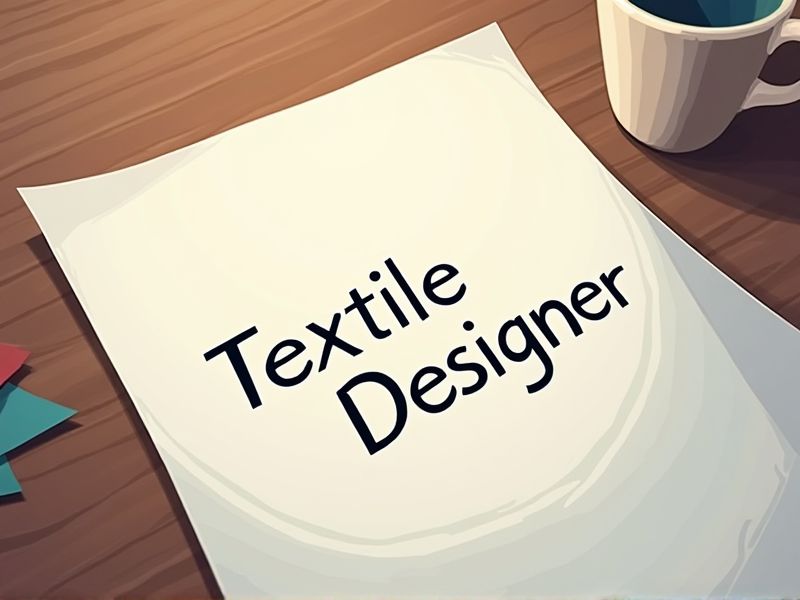
Textile designers play a crucial role in the fashion and interior design industries, where precision and expertise are key to creating appealing and functional fabrics. Certain certifications equip them with advanced skills and knowledge in areas like fabric technology, color theory, and design software, enhancing their credibility and marketability. These certifications ensure that designers stay updated with industry trends and standards, facilitating innovation and sustainability in their work. Below are some essential certifications that can benefit those pursuing a career in textile design.
Adobe Certified Expert (ACE) - Photoshop
Possessing an Adobe Certified Expert (ACE) credential in Photoshop equips textile designers with advanced skills for creating intricate patterns and textures. Enhanced proficiency in Photoshop streamlines the design process, reducing time spent on revisions and improving overall efficiency. The certification offers credibility, distinguishing designers in a competitive industry by validating their expertise with a widely recognized standard. Mastery of Photoshop tools allows for more innovative and precise design work, leading to more compelling and market-ready textile products.
Adobe Certified Expert (ACE) - Illustrator
Possessing an Adobe Certified Expert (ACE) credential in Illustrator demonstrates advanced proficiency, which enhances a textile designer's ability to create intricate patterns and designs efficiently. This certification provides credibility, making designers more competitive in securing roles within the textile industry where high-level software skills are essential. Mastery of Illustrator, validated by this certification, allows designers to innovate and execute complex designs with precision, a critical need in fast-paced fashion cycles. Companies often prioritize certified professionals, as their verified skill set reduces training time and boosts productivity, directly impacting project timelines and quality.
Textile Design Certificate from recognized fashion institutes
A Textile Design Certificate from recognized fashion institutes provides specialized training that enhances creative and technical skills. Employers often seek candidates with formal qualifications, which can lead to better job prospects. Networking opportunities during the course connect aspiring designers with industry professionals, fostering valuable relationships. Knowledge of industry standards and current trends gained through such a program ensures designers create competitive and innovative designs.
Digital Textile Printing Certification
Digital Textile Printing Certification equips textile designers with the necessary skills in advanced printing technologies, essential for staying competitive in a rapidly evolving industry. Knowledge of certification assures employers of a designer's capability to operate cutting-edge printing equipment, directly impacting job opportunities and professional advancement. Acquiring the certification enhances a designer's ability to produce high-quality, sustainable prints, meeting increasing consumer demands for eco-friendly products. Certification fosters innovation by ensuring that designers are well-versed in the latest printing techniques and design software, driving creative exploration and new design possibilities.
Color Theory and Color Management Certification
Understanding color theory enables textile designers to effectively create aesthetically pleasing and emotionally impactful designs. Mastery in color management ensures consistent reproduction of these designs across various media and fabrics, maintaining brand integrity. Certification in these areas increases a designer's credibility and value to employers and clients. Enhanced skills in this field can lead to innovative design solutions and a competitive edge in the textile industry.
CAD for Textile Design Certification
CAD for Textile Design Certification equips designers with essential skills to efficiently create and modify textile patterns, which accelerates the design process. The certification ensures designers are proficient with industry-standard software, increasing their employability and competitiveness in the textile market. With CAD skills, designers can accurately visualize and simulate their creations, reducing material waste in prototyping. Certified textile designers can better collaborate with manufacturers, ensuring design precision and reducing production errors.
Sustainable Textile Practices Certification
Sustainable Textile Practices Certification is needed for textile designers to ensure environmentally responsible production, as the textile industry is a significant contributor to pollution. Increased consumer demand for eco-friendly products puts pressure on designers to demonstrate their commitment to sustainability. Certification provides designers with a trustworthy label that enhances their marketability and aids in meeting regulatory requirements. Access to sustainable resources and methods through certification can lead to innovation and improved product quality in a competitive market.
Pattern Making and Draping Certification
Earning a Pattern Making and Draping Certification equips textile designers with essential technical skills, enhancing their ability to create precise garment designs. This specialized knowledge increases efficiency in translating fabric concepts into functional clothing, crucial for the fast-paced fashion industry. Certification also boosts credibility, making designers more attractive to potential employers and competitive in the job market. Understanding the intricacies of pattern making and draping elevates creative capabilities, allowing designers to innovate while maintaining garment quality and fit.
Textile Technology and Innovation Certification
Certification in Textile Technology and Innovation provides textile designers with updated skills needed to adapt to emerging industry trends. With advancements in sustainable materials, certification ensures that designers understand eco-friendly practices. Familiarity with cutting-edge technology through such programs can enhance product design efficiency and quality. As the market grows competitive, certified knowledge in innovation can be a key differentiator for career advancement.
Project Management Professional (PMP) Certification
Obtaining a PMP certification equips textile designers with structured project management skills, enhancing their ability to lead and manage complex design projects efficiently. The certification fosters critical time and cost management abilities, enabling designers to meet tight deadlines and budget constraints frequently encountered in the textile industry. With a PMP, textile designers can better coordinate diverse teams, ensuring seamless collaboration across design, production, and marketing functions. Employers often recognize PMP certification as a mark of professionalism and competence, giving certified designers an edge in a competitive job market.
Summary
When you, as a textile designer, obtain certifications, your industry credibility often increases. This enhanced reputation can lead to more project opportunities and potentially higher income. With certification, you may gain advanced skills, allowing you to tackle complex design challenges more effectively. Such credentials can also expand your professional network, fostering collaborations that drive career advancement.
